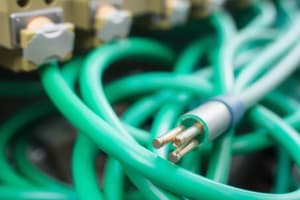Podcast
Questions and Answers
What type of cable is primarily used in cable systems?
What type of cable is primarily used in cable systems?
- Twisted pair cable
- Fiber-optic cable
- Electrical cable
- Coaxial cable (correct)
Which equipment is located at the headend of a cable operator in a cable system?
Which equipment is located at the headend of a cable operator in a cable system?
- Wireless access point
- Cable modem
- DSL access multiplexer
- Cable modem termination system (correct)
What is the main characteristic of Asymmetric DSL (ADSL)?
What is the main characteristic of Asymmetric DSL (ADSL)?
- Identical upload and download speeds
- Only functions under 1 mile
- Requires fiber-optic lines
- Higher download bandwidth than upload bandwidth (correct)
What is a key advantage of DSL technology over cable technology?
What is a key advantage of DSL technology over cable technology?
Which technology is primarily used in municipal wireless networks?
Which technology is primarily used in municipal wireless networks?
What does LTE Category 10 support for download and upload speeds?
What does LTE Category 10 support for download and upload speeds?
What is the primary requirement for satellite internet installation?
What is the primary requirement for satellite internet installation?
What component combines individual DSL connections from users into one high-capacity link to an ISP?
What component combines individual DSL connections from users into one high-capacity link to an ISP?
A cable system uses fiber optic cables to transmit radio frequency (RF) signals.
A cable system uses fiber optic cables to transmit radio frequency (RF) signals.
DSL technology allows for higher upload bandwidth than download bandwidth with Asymmetric DSL (ADSL).
DSL technology allows for higher upload bandwidth than download bandwidth with Asymmetric DSL (ADSL).
Wireless technologies like Municipal Wi-Fi use a mesh of interconnected access points.
Wireless technologies like Municipal Wi-Fi use a mesh of interconnected access points.
The distance for satisfactory ADSL service must exceed 5.46 km.
The distance for satisfactory ADSL service must exceed 5.46 km.
A Cable Modem Termination System (CMTS) is located at the subscriber end of a cable system.
A Cable Modem Termination System (CMTS) is located at the subscriber end of a cable system.
DSL is a shared medium, meaning multiple users share the same connection.
DSL is a shared medium, meaning multiple users share the same connection.
Satellite Internet requires a clear view toward the equator for antenna installation.
Satellite Internet requires a clear view toward the equator for antenna installation.
LTE Category 10 can support download speeds of 450 Mb/s.
LTE Category 10 can support download speeds of 450 Mb/s.
A cable system uses a coaxial cable that carries ______ signals across the network.
A cable system uses a coaxial cable that carries ______ signals across the network.
Digital Subscriber Line (DSL) provides high-speed connections over installed ______ wires.
Digital Subscriber Line (DSL) provides high-speed connections over installed ______ wires.
Asymmetric DSL (ADSL) provides higher downstream ______ to the user than upload bandwidth.
Asymmetric DSL (ADSL) provides higher downstream ______ to the user than upload bandwidth.
The key component at the carrier's Central Office that combines individual DSL connections is called ______.
The key component at the carrier's Central Office that combines individual DSL connections is called ______.
Municipal Wi-Fi networks typically use a mesh of interconnected ______ for coverage.
Municipal Wi-Fi networks typically use a mesh of interconnected ______ for coverage.
For satisfactory ADSL service, the local loop length must be less than ______ miles.
For satisfactory ADSL service, the local loop length must be less than ______ miles.
The primary installation requirement for satellite internet is that the antenna must have a clear view toward the ______.
The primary installation requirement for satellite internet is that the antenna must have a clear view toward the ______.
In cellular technology, mobile phones communicate through nearby ______.
In cellular technology, mobile phones communicate through nearby ______.
Match the following broadband connection types with their characteristics:
Match the following broadband connection types with their characteristics:
Match the following DSL types with their bandwidth characteristics:
Match the following DSL types with their bandwidth characteristics:
Match the following equipment with their functions in a cable system:
Match the following equipment with their functions in a cable system:
Match the following wireless technologies with their descriptions:
Match the following wireless technologies with their descriptions:
Match the following characteristics with the strength of broadband connections:
Match the following characteristics with the strength of broadband connections:
Match the following broadband connection types with their installation requirements:
Match the following broadband connection types with their installation requirements:
Match the following attributes to their respective DSL types:
Match the following attributes to their respective DSL types:
Match the following broadband services with their provided features:
Match the following broadband services with their provided features:
Flashcards are hidden until you start studying
Study Notes
Broadband Connections
- Cable System Overview
- Utilizes coaxial cable to transmit radio frequency (RF) signals.
- Provides high-speed Internet access, digital cable TV, and residential phone services.
- Operates on hybrid fiber-coaxial (HFC) networks for fast data transmission.
Cable Components
- Essential Equipment for Cable Systems
- Cable Modem Termination System (CMTS): Located at the cable operator's headend, functions as a router with databases for Internet services to subscribers.
- Cable Modem (CM): Installed on the subscriber end to enable connectivity.
Digital Subscriber Line (DSL)
-
DSL Definition
- Digital Subscriber Line allows high-speed Internet connections via existing copper telephone wires.
-
Types of DSL
- Asymmetric DSL (ADSL): Higher download speeds than upload speeds.
- Symmetric DSL (SDSL): Equal download and upload speeds.
- ADSL service requires local loop lengths less than 3.39 miles (5.46 km) for optimal performance.
DSL Connections
-
Connection Setup
- Established between customer premises equipment (CPE) and a DSL access multiplexer (DSLAM) at the Central Office (CO).
-
Key Components
- Transceiver: Typically a modem that connects a user's computer to the DSL.
- DSLAM: Aggregates individual DSL connections into a high-capacity link to an Internet Service Provider (ISP).
-
DSL Advantages
- Unlike cable technology, DSL offers dedicated connections, avoiding shared bandwidth issues.
Wireless Connection
-
Broadband Wireless Technologies
- Municipal Wi-Fi: Uses a mesh of interconnected access points for city-wide Internet access.
- Cellular/Mobile: Utilizes radio waves via cell towers, with speeds improving significantly; LTE Category 10 supports 450 Mb/s download and 100 Mb/s upload.
- Satellite Internet: Ideal for remote areas without terrestrial Internet; requires antenna aiming toward the equator for effective installation.
-
Market Trends
- WiMAX has largely been supplanted by LTE for mobile connectivity, whereas cable and DSL dominate fixed access.
Comparing Broadband Solutions
- Factors Influencing Broadband Choice
- Cable: Bandwidth shared among users leading to slower speeds during peak hours.
- DSL: Bandwidth limited by the distance from the ISP's central office.
- Fiber-to-the-Home: Requires infrastructure for direct fiber installation at homes.
- Cellular/Mobile: Coverage can be inconsistent.
- Wi-Fi Mesh: Often lacks widespread municipal deployment.
- Satellite: Generally high cost with limited user capacity.
Broadband Connections
- Cable System Overview
- Utilizes coaxial cable to transmit radio frequency (RF) signals.
- Provides high-speed Internet access, digital cable TV, and residential phone services.
- Operates on hybrid fiber-coaxial (HFC) networks for fast data transmission.
Cable Components
- Essential Equipment for Cable Systems
- Cable Modem Termination System (CMTS): Located at the cable operator's headend, functions as a router with databases for Internet services to subscribers.
- Cable Modem (CM): Installed on the subscriber end to enable connectivity.
Digital Subscriber Line (DSL)
-
DSL Definition
- Digital Subscriber Line allows high-speed Internet connections via existing copper telephone wires.
-
Types of DSL
- Asymmetric DSL (ADSL): Higher download speeds than upload speeds.
- Symmetric DSL (SDSL): Equal download and upload speeds.
- ADSL service requires local loop lengths less than 3.39 miles (5.46 km) for optimal performance.
DSL Connections
-
Connection Setup
- Established between customer premises equipment (CPE) and a DSL access multiplexer (DSLAM) at the Central Office (CO).
-
Key Components
- Transceiver: Typically a modem that connects a user's computer to the DSL.
- DSLAM: Aggregates individual DSL connections into a high-capacity link to an Internet Service Provider (ISP).
-
DSL Advantages
- Unlike cable technology, DSL offers dedicated connections, avoiding shared bandwidth issues.
Wireless Connection
-
Broadband Wireless Technologies
- Municipal Wi-Fi: Uses a mesh of interconnected access points for city-wide Internet access.
- Cellular/Mobile: Utilizes radio waves via cell towers, with speeds improving significantly; LTE Category 10 supports 450 Mb/s download and 100 Mb/s upload.
- Satellite Internet: Ideal for remote areas without terrestrial Internet; requires antenna aiming toward the equator for effective installation.
-
Market Trends
- WiMAX has largely been supplanted by LTE for mobile connectivity, whereas cable and DSL dominate fixed access.
Comparing Broadband Solutions
- Factors Influencing Broadband Choice
- Cable: Bandwidth shared among users leading to slower speeds during peak hours.
- DSL: Bandwidth limited by the distance from the ISP's central office.
- Fiber-to-the-Home: Requires infrastructure for direct fiber installation at homes.
- Cellular/Mobile: Coverage can be inconsistent.
- Wi-Fi Mesh: Often lacks widespread municipal deployment.
- Satellite: Generally high cost with limited user capacity.
Broadband Connections
- Cable System Overview
- Utilizes coaxial cable to transmit radio frequency (RF) signals.
- Provides high-speed Internet access, digital cable TV, and residential phone services.
- Operates on hybrid fiber-coaxial (HFC) networks for fast data transmission.
Cable Components
- Essential Equipment for Cable Systems
- Cable Modem Termination System (CMTS): Located at the cable operator's headend, functions as a router with databases for Internet services to subscribers.
- Cable Modem (CM): Installed on the subscriber end to enable connectivity.
Digital Subscriber Line (DSL)
-
DSL Definition
- Digital Subscriber Line allows high-speed Internet connections via existing copper telephone wires.
-
Types of DSL
- Asymmetric DSL (ADSL): Higher download speeds than upload speeds.
- Symmetric DSL (SDSL): Equal download and upload speeds.
- ADSL service requires local loop lengths less than 3.39 miles (5.46 km) for optimal performance.
DSL Connections
-
Connection Setup
- Established between customer premises equipment (CPE) and a DSL access multiplexer (DSLAM) at the Central Office (CO).
-
Key Components
- Transceiver: Typically a modem that connects a user's computer to the DSL.
- DSLAM: Aggregates individual DSL connections into a high-capacity link to an Internet Service Provider (ISP).
-
DSL Advantages
- Unlike cable technology, DSL offers dedicated connections, avoiding shared bandwidth issues.
Wireless Connection
-
Broadband Wireless Technologies
- Municipal Wi-Fi: Uses a mesh of interconnected access points for city-wide Internet access.
- Cellular/Mobile: Utilizes radio waves via cell towers, with speeds improving significantly; LTE Category 10 supports 450 Mb/s download and 100 Mb/s upload.
- Satellite Internet: Ideal for remote areas without terrestrial Internet; requires antenna aiming toward the equator for effective installation.
-
Market Trends
- WiMAX has largely been supplanted by LTE for mobile connectivity, whereas cable and DSL dominate fixed access.
Comparing Broadband Solutions
- Factors Influencing Broadband Choice
- Cable: Bandwidth shared among users leading to slower speeds during peak hours.
- DSL: Bandwidth limited by the distance from the ISP's central office.
- Fiber-to-the-Home: Requires infrastructure for direct fiber installation at homes.
- Cellular/Mobile: Coverage can be inconsistent.
- Wi-Fi Mesh: Often lacks widespread municipal deployment.
- Satellite: Generally high cost with limited user capacity.
Broadband Connections
- Cable System Overview
- Utilizes coaxial cable to transmit radio frequency (RF) signals.
- Provides high-speed Internet access, digital cable TV, and residential phone services.
- Operates on hybrid fiber-coaxial (HFC) networks for fast data transmission.
Cable Components
- Essential Equipment for Cable Systems
- Cable Modem Termination System (CMTS): Located at the cable operator's headend, functions as a router with databases for Internet services to subscribers.
- Cable Modem (CM): Installed on the subscriber end to enable connectivity.
Digital Subscriber Line (DSL)
-
DSL Definition
- Digital Subscriber Line allows high-speed Internet connections via existing copper telephone wires.
-
Types of DSL
- Asymmetric DSL (ADSL): Higher download speeds than upload speeds.
- Symmetric DSL (SDSL): Equal download and upload speeds.
- ADSL service requires local loop lengths less than 3.39 miles (5.46 km) for optimal performance.
DSL Connections
-
Connection Setup
- Established between customer premises equipment (CPE) and a DSL access multiplexer (DSLAM) at the Central Office (CO).
-
Key Components
- Transceiver: Typically a modem that connects a user's computer to the DSL.
- DSLAM: Aggregates individual DSL connections into a high-capacity link to an Internet Service Provider (ISP).
-
DSL Advantages
- Unlike cable technology, DSL offers dedicated connections, avoiding shared bandwidth issues.
Wireless Connection
-
Broadband Wireless Technologies
- Municipal Wi-Fi: Uses a mesh of interconnected access points for city-wide Internet access.
- Cellular/Mobile: Utilizes radio waves via cell towers, with speeds improving significantly; LTE Category 10 supports 450 Mb/s download and 100 Mb/s upload.
- Satellite Internet: Ideal for remote areas without terrestrial Internet; requires antenna aiming toward the equator for effective installation.
-
Market Trends
- WiMAX has largely been supplanted by LTE for mobile connectivity, whereas cable and DSL dominate fixed access.
Comparing Broadband Solutions
- Factors Influencing Broadband Choice
- Cable: Bandwidth shared among users leading to slower speeds during peak hours.
- DSL: Bandwidth limited by the distance from the ISP's central office.
- Fiber-to-the-Home: Requires infrastructure for direct fiber installation at homes.
- Cellular/Mobile: Coverage can be inconsistent.
- Wi-Fi Mesh: Often lacks widespread municipal deployment.
- Satellite: Generally high cost with limited user capacity.
Studying That Suits You
Use AI to generate personalized quizzes and flashcards to suit your learning preferences.



